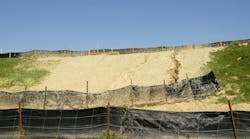Study Shows Nutrients in Stormwater Worsen Coral Bleaching
As if we needed another reason to reduce nutrient loads in stormwater runoff, a recent study has shown that nutrients can aggravate the already negative effects of climate change on corals to trigger mass coral bleaching. The study, "Nutrient-supplying ocean currents modulate coral bleaching susceptibility," has been published in Science Advances.
Coral reef environments are typically low in naturally occurring nutrients like nitrogen and phosphorous compounds, but nutrients from fertilizers and stormwater runoff can enter reefs from adjacent coastlines, and passing ocean currents can carry nutrients from elsewhere.
Lead author Dr. Thomas DeCarlo, a postdoctoral fellow at King Abdullah University of Science and Technology (KAUST) in Saudi Arabia, says corals are sensitive to high levels of nutrients.
"As the climate warms, mass coral bleaching could occur as often as annually within this century," Dr. DeCarlo says. "In our study, we found that already heat-stressed corals exposed to excess nutrient levels were even more susceptible to bleaching."
The study suggests that ecosystem managers can reduce the impacts of coral bleaching by implementing strategies to reduce nutrient stress in areas subject to heat stress.
Co-author Professor John Pandolfi from the ARC Centre of Excellence for Coral Reef Studies (Coral CoE) at The University of Queensland says this and previous studies, including on the Great Barrier Reef, related coral bleaching to combinations of heat and nutrient stresses.
"Our results provide a roadmap for coral reef conservation efforts to be at their most effective," Prof Pandolfi says. "We suggest oceanographic processes should be included when deciding when and where to allocate resources or protection."
.
The Red Sea was chosen as a study site as it is one of the only marine environments where the effects of summertime nutrients and heat stress are independent of each other: only one area has a single major source of nutrients in the summer, when a water mass brings nutrients to the surface through a process called upwelling.
Previous field tests on the role of nutrients in coral bleaching were otherwise difficult: nutrients and temperature often co-vary in the ocean, making it difficult to disentangle their effects. Nutrient loads are also difficult to measure in the same way sea surface temperatures are, via satellite.
"The fact that nutrients are more difficult to measure than temperature may be restricting our recognition of their importance," Dr. DeCarlo says. "And we need greater longer-term monitoring efforts of nutrient levels on coral reefs."
"Incorporating nutrient-supplying ocean currents into coral bleaching forecasts will enhance those predictions that are based on temperatures alone," Professpr Pandolfi says.
"Our research suggests that projections of coral reef futures should move beyond solely temperature-based stress to incorporate the influence of ocean current systems on coral reef nutrient enrichment, and thus susceptibility to bleaching," says Dr. DeCarlo.


